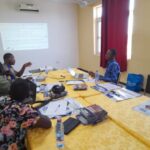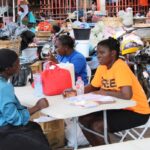The Legal Resources Centre together with LADA Institute, an NGO has organised a forum, putting the spotlight on judicial accountability, to raise public confidence in Ghana’s electoral adjudication system and reduce the risk of electoral violence.
The forum, which stoked discussions about how to ensure legal processes were followed in case of any misunderstanding about polling process, safeguard political rights of the public, and deepen knowledge of people about their electoral rights.
Ms Daphne Lariba Nabila, Executive Director of Legal Resources Centre told the Ghana News Agency after the event in Accra, that the overall intention was to help citizens identify legal channels and cut down risks of violence that could emanate from electoral proceedings and processes.
She said: “We are running this programme on the judicial system accountability and we are looking at electoral laws in Ghana, how we can push for citizens to recognise the legal channels to addressing electoral disputes.”
“As stakeholders, we know that there are legal channels, we know that citizens must use these legal channels and not to resort to other ways of resolving dispute.
“We want to have confidence in the system, and that is why we thought that we should have this meeting so that everyone will know about the channels that are available to ordinary citizens.”
Stakeholders from the ministries, agencies and departments including representatives from civil society groups, the security agencies, National Commission on Civic Education, Electoral Commission and Attorney-General’s Department, swarmed the judicial training institute at the Court Complex to contribute to the discussion.
In response to demystifying the court system, ensuring judicial accountability and intensifying public education on the judiciary, Ms Nabila said there is a huge task ahead to reach out to the vast majority of ordinary citizens to understand the legal channels available for restoration of justice.
“At the end of the day you realized that we have a lot more to do because if you look at the participants that were here, you would have thought they will know a lot more than ordinary citizens, but you see that we need to do a lot more to involve citizens for them to know what the laws say when it comes to electoral dispute and how you can seek redress.”
Mr Rowland Atta-Kesson, a Lawyer, made a presentation on ensuring judicial accountability, drawing many examples from the 2012 presidential election petition, and expressed the need to demystify judicial proceedings and encourage full delivery of judgments as part of the ways to accounting to the people.
He said access to law reports and journals would enhance judicial accountability but unfortunately the materials or information are not readily available or accessible by ordinary citizens to read and better inform themselves.
He said: “About Judicial Accountability, as a State institution, it is accountable, but the point is this, unlike the other State institutions like the Executive and the Legislature where we directly elect them, so we don’t usually understand accountability from the Judiciary in this context.
“But that is not to say that, the fact that they are not elected does not mean that they are not accountable.
“There are several forms of accountability, so for example, the quality of judgment they [judges] deliver, issues of integrity and ethics, we’ve seen that, and of course, you can say that there are preexisting institutional conditions that must foster accountability.”
Mr Atta-Kesson noted that in terms of quality of judgment, there is there need to have an effective system of disseminating the decisions in the forms of law journals and law reports.
“But the question is how many times do we hear of cases even reported. Currently, it is by private initiative, which is not too encouraging, if we can get the government well-resourced to publish a lot judicial cases, I believe many people will have access to these judgments, and then they read it, they will get the understanding and maybe critic it.”
He said judicial accountability is all about public education, and cited the nationwide televised 2012 electoral petition proceedings as something that boosted the bench image and deepened accountability in the Judiciary.
The meeting was supported by Star Ghana under the project “consolidating the electoral justice system in Ghana,” and aims to educate people on their electoral rights, reduce risks of electoral violence, ensure judicial accountability and build public confidence in the judicial system.
Source: http://www.ghananewsagency.org/social/legal-resources-centre-puts-spotlight-on-judicial-accountability-108554




